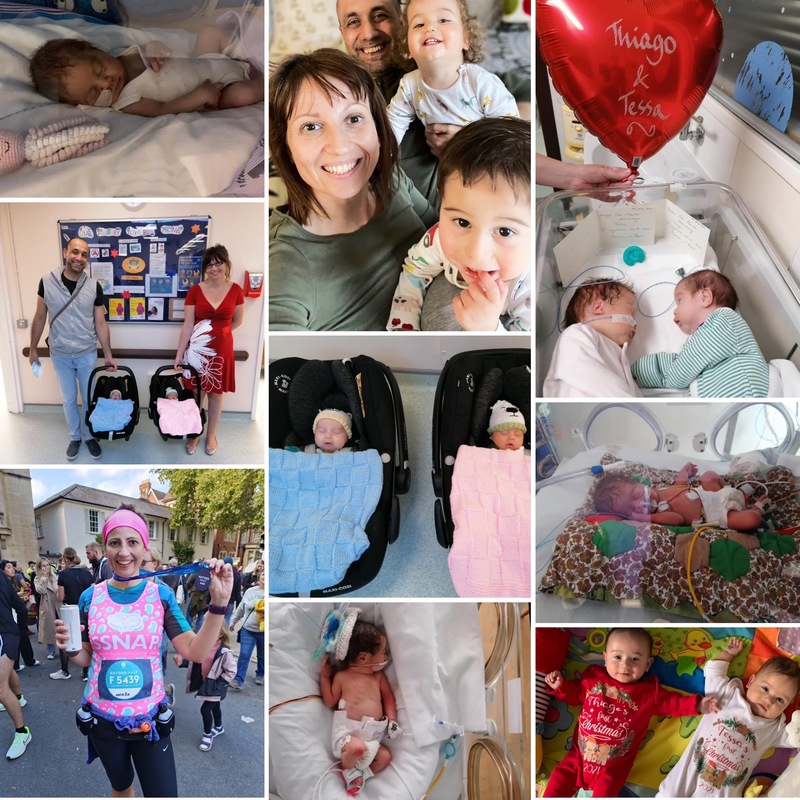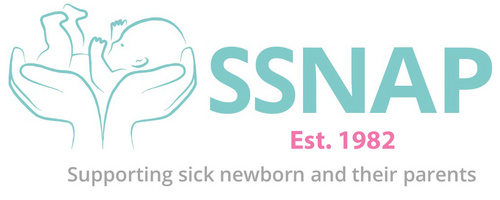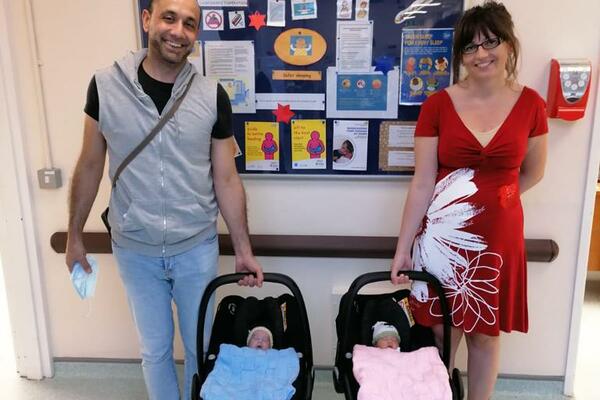On 25 June 2021 I gave birth to my beautiful twins, Thiago and Tessa. At only 31 (30+6) weeks of pregnancy. Tiny and fragile, they were immediately moved to the NICU, at the John Radcliffe Hospital in Oxford - where an incubator became their new home for the following 37 days. Those were the longest and most difficult 37 days of our entire life.
My journey to becoming a mum started more than two years ago, when my partner and I decided to embark on the IVF journey. It took 2 failed cycles, a miscarriage, many tears, anxiety and pain, but at the beginning of 2021 we could finally see two heartbeats. “Pregnancy is no disease”, I’ve been told, but what I went through in 7 long months was the most horrible and difficult experience of my entire life. Hyperemesis gravidarum (extreme pregnancy sickness) was one of the rare conditions I suffered from, very hard on the body and mentally very demanding. At 20 weeks I was diagnosed with placenta previa, which caused a series of very frightening big and unpredictable bleedings. When the first one happened I was at home on my own, and seeing a river of blood coming down my legs was frightening. Your mind starts to process many dark and scary thoughts, and one of them is death. After the second haemorrhage at 28 weeks, I was diagnosed with PPROM (Premature rupture of membranes), and started leaking amniotic fluid. That’s when the doctors made the decision to keep me in until Tessa and Thiago’s birth. I spent one month in the hospital surrounded by other women with similar or worse conditions. I saw women coming and going. I listened to other women’s stories, empathised with most of them, and made friends. At night I could hear them crying and sobbing. Same as me. I cried every day.
My daily routine consisted of blood tests to check my infection levels, steroid and anticoagulant injections, transfusions, and meeting different doctors every day. ‘We’ll try to take you to 37 weeks of pregnancy’, said one doctor. ‘I think it’ll be safer if we deliver at 34 weeks’, I’ve been told by another doctor, after my third bleed.
After each bleed I experienced panic attacks, after each bleed my anxiety and fear to see blood again were mixed with compulsions and obsessive thoughts, as I had to check my pad every 10 minutes. I was scared to get up from the hospital bed, I was scared to go to the toilet on my own, I was scared to have a shower on my own. Luckily I have the most supportive and empathetic partner in the world, and he was next to me after each bleeding and anxiety episode.
On the morning of 25 June I had a fourth bleed. This time I tried to stay calm. ‘It’s just another bleed’, I told myself. But this time it was different. ‘We need to deliver now’, my partner and I heard, ‘and we need to make a decision pretty quickly’. Our mind went dark. What would’ve that meant for me, for my babies? Will they be okay? Will they be healthy? I had so many questions and fears flooding my mind. But waiting any longer could’ve meant risking mine and my babies’ life. Thiago’s placenta had already detached from my uterus and his heartbeat was dropping.
I was taken to the theatre. But I wasn’t mentally prepared for that. My pregnancy that day was interrupted.
I wonder why a woman needs to stay awake during a C-section. It’s a massive surgery and experiencing everything was traumatising. I remember being surrounded with many doctors, midwives and neonatologists, ready to provide care to my babies.
The fluids started entering my body, my mind became very dizzy, and my whole body numbed. I remember the pulling sensation and pressure when Tessa and Thiago came out, I remember hearing their weak cry. I saw them for just two minutes, as they were taken immediately to the NICU.
I lost nearly 3 litres of blood, I had two blood transfusions and my physical recovery was incredibly slow. But that was nothing compared to what I felt emotionally.
When the pain from the surgery eased off a bit and I was able to get out of bed, I went to visit my babies in the NICU. They were there, in two separate incubators, on the opposite side of the room. My two tiny babies were surrounded by wires and tubes, there were tubes inside their tiny bodies. My two tiny babies weren’t able to breathe on their own. I cried all the tears I had. I felt guilty, I felt useless, I felt impotent, I felt like I was dying inside. That’s when I was approached by two lovely ladies from SSNAP. ‘We’re here for you all’, my partner and I heard. ‘You can talk to us’’, they said while offering a chocolate snack. I immediately felt so much warmth, so much compassion, so much kindness. A small gesture that made me feel slightly better. A SSNAP box was waiting for us, next to each of our baby’s incubator, with information on what SSNAP is and what they do for parents whose babies are in the NICU. ‘There are other mums like me’, I thought. ‘I’m not alone’. In each box we also found a little bear, that today, 2 years later, I still jealously cherish.
I suffered from PTSD and I experienced flashback memories for many weeks following the delivery. I wasn’t able to stay in the NICU without crying, I wasn’t able to touch my babies, I was scared to hurt them. But I wasn’t on my own. Thanks to the SSNAP team who looked after me every day, I was able to overcome my fears, I was able to talk about my traumatic experience, hold my babies on my chest for the first time, and learn how to get involved into my babies’ daily care. They were able to listen, to use kindness and empathy to approach a vulnerable me, they were able to respect my silence when I wanted to be silent. For 37 days they were there for myself and my family. SSNAP became my safe place.
Luckily my babies were doing well and THAT day finally arrived: we were going home. No more incubators, no more reliance on beeping monitors and their cary fluctuating numbers, no more feeding tubes down the throat and gastric aspirates, no more hospital schedules, no more painful procedures. We are leaving all this behind, but what we were taking home from the NICU World is the immense gratitude for all the support and help we’ve got from all the people who give their own time to look after all the premature and sick babies and their families, making sure they grow and thrive, people who gave us advice and helped us build our confidence as parents of premature babies, answering all our questions and guiding us through our journey in the NICU.
We were taking home new friendships and endless stories from other parents, with different experiences but with whom we shared the same emotions. Those parents are the only ones who can understand what the NICU world really is. We’re taking home the value of celebrating every milestone with our babies, that we always must have hope and not take anything for granted.
Today I’m a proud member of SSNAP and I also ran the Oxford Half Marathon in 2022 as my way of saying thank you to everything SSNAP has done for us. Our story is our legacy and my hope is that one day Tessa and Thiago will be proud to share the story of how much love they received thanks to SSNAP.






